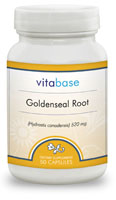| |
Goldenseal |
|
|
Goldenseal (Hydrastis canadensis) is a perennial herb in the buttercup family Ranunculaceae, native to southeastern Canada and the northeastern United States. Goldenseal is a perennial. The plant grows from a yellowish root and forms a hairy stem with five-parted leaves, green white flowers with no petal and a fruit that resembles a raspberry. It may be distinguished by its thick, yellow knotted rootstock as well as its large, rounded leaves. The plant reaches a height of about 0.3 meters and is characterized by an erect, hairy stem, small, greenish-white flowers that bloom in early spring and subsequently become clusters of red berries, and a thick yellow rhizome. The leaves have from five to nine lobes and when full grown are from 6 to 8 inches in diameter. The stem is terminated by a single greenish-white flower. There are no petals and the three sepals fall early leaving many conspicuous stamens. The red fruit looks like a raspberry. The root fibers grow out of the long, yellow rhizomes, and both are used medicinally. Goldenseal is also known as ox-eye daisy, golden daisy, herb Margaret, maudlinwort, moon daisy, eye balm, eye root, jaundice root, orange root, ground raspberry, Indian dye, tumeric root, yellow Indian paint, yellow puccoon, wild curcuma, warnera, Indian plant, yellow root, and others. |
| |
Active constituents of goldenseal |
|
| Goldenseal contains a group of isoquinoline alkaloids, including berberine, hydrastine, canadine, berberastine, hydrastinine tetrahydroberberastine, and canalidine. Berberine is bitter, antibiotic, antibacterial, and amebicidal, it has a sedative action on the central nervous system. Berberine that is antibiotic against Streptococci and also prevents the attachment of Streptococci to the throat. Berberine has proven to inhibit the growth of numerous pathogens. Berberine stimulates uterine contractions, and the herb is useful to treat pelvic inflammatory disease (PID). Hydrastine is sometimes used alone to bolster the immune system, treat diverse infections, soothe intestinal upsets, relieve the pain of sciatica or muscles and joints. Canadine has been proven to stimulate the muscles of the uterus. Goldenseal is also high in iron, manganese, silicon, and other minerals. |
| |
Medicinal uses and health benefits of goldenseal |
|
| Goldenseal is used as an antiseptic, astringent, diuretic, laxative, hemostatic, stomachic, tonic, and vermifuge agent. Goldenseal has been used in a variety of conditions and diseases such as dyspepsia, diphtheria, gastric catarrh, skin rashes, scarlet fever, smallpox, venereal disease, vomiting, internal inflammations, spinal meningitis, and poor blood circulation in mucous membranes. Taken internally, goldenseal increases digestive secretions, astringes the mucous membranes, and checks inflammation. Applied topically as rhizome bark powder or tincture, Goldenseal can help treat gum disease, conjunctivitis, vaginal infection, eczema, impetigo, and inflammations of the ear. Goldenseal is often used in combination with Echinacea in the treatment of upper respiratory infections. Goldenseal is a popular remedy for canker sores, sore throat, and upper respiratory infections. Drinking goldenseal tea can also help to flush bacteria away from the urinary tract. Goldenseal is effective for acute infectious diarrhea caused by a variety of organisms including Escherichia coli, Giardia and Salmonella. Its astringency helps reduce heavy menstrual bleeding, it is helpful in circumstances of excessive and painful menstruation or postpartum hemorrhage. Goldenseal is a mild laxative and internal body cleanser. The herb goes straight to the bloodstream and eliminates infection in the body. |
| |
Dosage and administration of goldenseal |
|
| Standardized extracts of Goldenseal are available in liquid, tablet, and capsule form. Recommended doses of the powdered root range from 4 to 6 grams in tablet or capsule form per day. To disinfect cuts and scrapes, apply goldenseal cream to the affected area with a clean andwet cloth three times daily. For general inflammation, goldenseal can be taken in doses from 500 to 2,000 mg up to three times a day. |
| |
Side effects, precautions, interactions |
|
| Goldenseal is generally safe at recommended dosages. An overdose of goldenseal can be dangerous. High doses or prolonged use may result in vomiting, breathing difficulty, constipation, nausea, dyspnea, and hallucinations. People with high blood pressure or other cardiovascular diseases should not use this herb. It should not be used during pregnancy or lactation. Goldenseal use can destroy organisms that are beneficial to the body. Goldenseal may interfere with the blood-thinning drug heparin. Large doses may decrease the absorption of vitamin B. |
|
|
|
|
 Goldenseal's anti-bacterial properties show benefit against amoebic infections. It is antiseptic, diuretic, and acts as a mild laxative and internal body cleanser. Goldenseal has been used in the treatment of peptic ulcers. Because of its diuretic and anti-inflammatory properties it may help lower blood pressure. Vitabase's Goldenseal Root is ecologically farm grown without the use of harmful chemicals. The root is not harvested from the wild and therefore, the endangered wild population of goldenseal is not adversely impacted. Click here for more information.
Goldenseal's anti-bacterial properties show benefit against amoebic infections. It is antiseptic, diuretic, and acts as a mild laxative and internal body cleanser. Goldenseal has been used in the treatment of peptic ulcers. Because of its diuretic and anti-inflammatory properties it may help lower blood pressure. Vitabase's Goldenseal Root is ecologically farm grown without the use of harmful chemicals. The root is not harvested from the wild and therefore, the endangered wild population of goldenseal is not adversely impacted. Click here for more information.